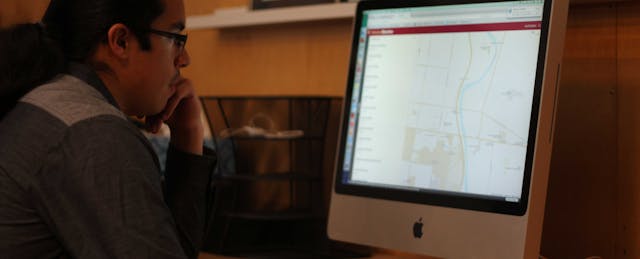While author Dave Eggers cautions against the ominous aspirations of tech startups in his novels, his nonprofit, ScholarMatch, uses technology to help low-income young people work towards a successful future—hopefully, one more fulfilling than in Customer Experience at The Circle.
Started in 2010, ScholarMatch offers information and mentoring to first-generation and low-income high school students throughout the college application process. Over 500 students drop into its storefront in San Francisco’s hip Mission neighborhood every year.
“One of the biggest issues first-generation and low-income students face is misalignment,” Eggers wrote to EdSurge in an email. While many have the scores and transcripts to attend colleges across the country—often with a full-ride—they aren’t aware of the options. As he explains, ScholarMatch’s seven employees and 75 annual volunteers provide “guidance about which colleges are actually graduating first-gen, low-income students, and doing so without leaving them with crippling debt.”
And technology plays its role. Eggers concedes, "In the case of college counseling and college access, technology can be helpful." Beyond advice, ScholarMatch also offers a way for students to avoid debt through crowdfunding. Students create personal online profiles including photos, interests and goals, and interested donors can contribute funding and mentorship throughout the college process. As of fall 2015, students will have raised almost $1,000,000 on the platform.
The nonprofit provided this guidance to Jessica Cheung, a graduate of Lowell High School, a San Francisco public school with eight counselors serving 2,718 students during the 2014-2015 school year. The daughter of first-generation immigrants, she was intimidated by the labyrinthine college application process, especially when it came to applying for financial aid.
“They came to help us work on college essays, and told us about a financial aid workshop there,” Cheung recalls. “ScholarMatch is not just a one-stop shop—I could go there if I needed a desk to work on my cover letters, or just to be around people who would give me the affection and guidance that students who come from my background don’t really get,” she says. “It’s an army of people who care about where you end up—that moral support is invaluable.”
According to the National Association for College Admission Counseling, an average California high school has one counselor for every 951 students. Even more troubling: One in five US high schools offer no school counselors at all. (Those are general guidance counselors—specialized college counselors are few and far between at public high schools.) Students who can’t afford the rising price tag of private college counseling often don’t know where to turn.
“We have students who come in and know nothing about the [college application] process. After a few hours working with our volunteers, they have an essay that’s top-notch and a list of colleges with real financial aid options, that they never heard of before they came here,” explains Diana Adamson, Executive Director of ScholarMatch. “A lot of low-income kids just don’t have access to someone who can open that door for them.”
In May 2015, ScholarMatch extended its services across the country with the launch of ScholarMatcher, an online database of schools hand-picked by the ScholarMatch team for their support of low-income students. It currently lists 296 schools—1,400 were evaluated—selected based on financial aid, academic rigor, student support and post-graduate success. The ScholarMatch team has called each school to ensure it offers additional resources specifically targeted for first-generation students.
According to Adamson, the highest-scoring colleges are a “surprising mix” of prestigious names that typically rank highly on US News & Reports “as well as some public institutions, like the University of Michigan, that do an amazing job with first-generation students.” The database “includes amazing small schools that don’t get much recognition, including lots of conservatories of music,” adds Selina Weiss, Communications Manager at ScholarMatch.
“The main strength of ScholarMatcher is that the data is immense and complex, as is the analysis, but the tool is meant to be very simple,” says Adamson. “With a few clicks, students can create a robust and realistic list for themselves.”
“With ScholarMatcher, a San Francisco public high school student who otherwise would have only applied to SF State and other CSU schools might become aware of, say, Ohio Wesleyan, a great school that provides very strong aid packages to students like them,” explains Eggers. He also hopes educators and community members will use the resource. “What ScholarMatcher can do for students, parents, and for the overworked and underpaid college counselors, is provide more pinpointed information about each student’s options,” he says.
Each school profile on ScholarMatcher includes information about student body size, institution type, religion affiliation, environment, test score policy, and admission selectivity. A map function allows students to see potential colleges from across the country. Cheung sees this as “especially important” for first-generation students, since “there’s this tendency to stay near home, and that may be their biggest priority.”

The acceptance letter doesn’t mark the end of a student’s engagement with ScholarMatch; for many, the community and mentor relationships continue throughout college and beyond.
During her freshman year at Fordham University, Cheung found that “it wasn’t sustainable financially, and I wasn’t happy there.” So she called ScholarMatch. Over the winter break of her freshman year, “I sat shoulder-to-shoulder with Noel [Program Director at ScholarMatch], narrowing down the schools I wanted to apply to,” she recalls. The ScholarMatch team supported her throughout the transfer process. “They really knew me and knew what would make a school notice me,” she says. “I don’t think I would have gotten into Middlebury without ScholarMatch pushing me to talk about my background in my essays.” This May, Cheung graduated from Middlebury, and started an internship at NPR with All Things Considered.
Cheung has high hopes for how ScholarMatcher can support other first-generation students across the country. “The tool didn’t exist for students like me,” she says. “But the list of schools [on ScholarMatcher] is hand-picked by people who really have the authority to make decisions about what schools students will thrive at.”


